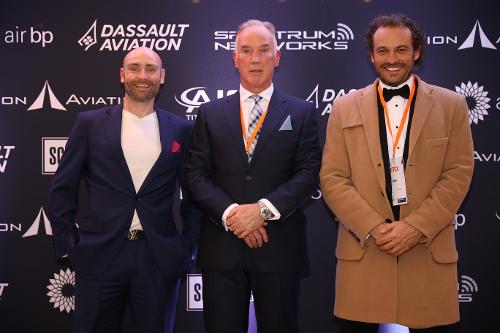Corporate Jet Investor Show Report 2022

Ian Petts (Head of Yachting and Aviation), Mark A Hagan (Director – VAT), and Andrew Heggs (Yachting and Aviation Manager) attended the Annual Corporate Jet Investor (CJI) event in London on March 8 & 9 2022. CJI London is a two-day conference attended by the industry’s most important operators and other leading figures. It is the ‘go-to’ European event for business aviation. Ian highlights the key themes covered at this year’s event.
Post covid trends
CJI 2022 comes at a critical moment for the industry, riding off the back of a post-covid economic boom, with order book backlogs of 18 months and increasing second-hand prices, but with the looming shadow of the Russian invasion of Ukraine reaching out over the event.
Time saving benefits, flexibility to visit more hubs and the post-covid effect that top executives want to spend more time with their families is driving the demand for jets. A realisation from executives that post-covid they need face to face meetings with their international leads, means the industry is optimistic for the future.
However, there were notes of caution too from some experienced delegates that increased interest rates, fuel prices, combined with parts and wage inflation, and potential margin calls from leveraged positions, could deter some owners. The industry is cyclical, largely in line with the equity markets so it was also widely remarked that if equity markets catch a sniffle, then business aviation will catch the flu..
Media
Connectivity in the cabin was a major theme with users demanding seamless high-speed connectivity and wanting a holistic audio-visual experience, both from hand-held devices but also from the jet image, entertainment and sound systems. On board conference calls by multiple passengers together with the navigation systems were currently pushing the capabilities of some jets to the limit. The business jet is very much becoming a mobile office and flying computer with full situational awareness.
Sustainability
The industry was keen to improve its public perceptions by exploring sustainable and synthetic aviation fuels (SAF) and carbon offsetting. Experts reported that SAF 2.0 could be with the industry within two years which would bring benefits over conventional fuels in a cleaner burn and less load on the engines, providing maintenance benefits. It was reported that SAF is very likely to be increasingly mandated across the world over time. When maintenance benefits are realised the shift to SAF is likely to be very quick.
There are indications that in the future efficiently-run jets from top manufacturers running with SAF and carbon offsets could negotiate preferential financing rates, with the reverse of the coin resulting in polluting jets suffering a financial penalty, with some banks not wanting to be exposed to the reputational risk of these assets.
Banks are also cautious that Environmental, Social and Governance (ESG) drives could impact on their long-term ability to finance jets unless the industry becomes more sustainable.
Tax, regulation and compliance
Delegates are conscious of the taxation environment. Brexit is still bringing issues for licencing and the trend for governments being pressured into bringing in luxury taxes has been seen with Canada introducing a tax specifically targeting private jets. The difficulty of navigating the US taxation environment was also explained with each state having different tax rules, a clear reminder to seek specialist tax advice early on in an aircraft acquisition and to keep that tax advice updated throughout its operation.
The UK Civil Aviation Authority delivered an excellent speech highlighting that from 1 January 2023 the UK will no longer be able to recognise EASA-issued certificates, approvals and licences for the operations and/or maintenance of UK registered aircraft. The CAA encouraged holders of EASA approvals and personnel licences to begin the process of obtaining their UK equivalents by applying to the CAA as soon as possible, as it takes time to complete applications.
The latest EU advice on sanctions was delivered by Robert Baltus, European Business Aircraft Association's Chief Operating Officer. The emphasis was on double-checking the status of passengers, prospective owners, fractional owners and charterers and seeking legal advice. As a result, the role and importance of compliance staff in the industry would be increased.
Future machinery
Several representatives from new manufacturers of electric vertical take-off machines were present at the event with fast timelines to production. While they are aiming for public transport, it was also mentioned that it won’t be very long before you see one on the back of a super yacht, since their range, versatility and environmental credentials make them the perfect match for time-poor billionaires trying to reach their yacht in anonymity, safety and security.
Conclusion
Following some dangerous accidents with clusters of unlicenced, uninsured, unsafe planes and inexperienced crew, the industry renewed its hard push against illegal charters and the need to educate first time entrants to the charter market to only operate with reputable operators and brokers.
Please contact Ian Petts to discuss your circumstances, aircraft needs or for a holistic tax strategy for your aircraft operation.

Get in touch
If you have any questions, or would like to learn more about taking the next steps with Equiom, please select one of the options below.
Choose a location and contact the team Use our website form
